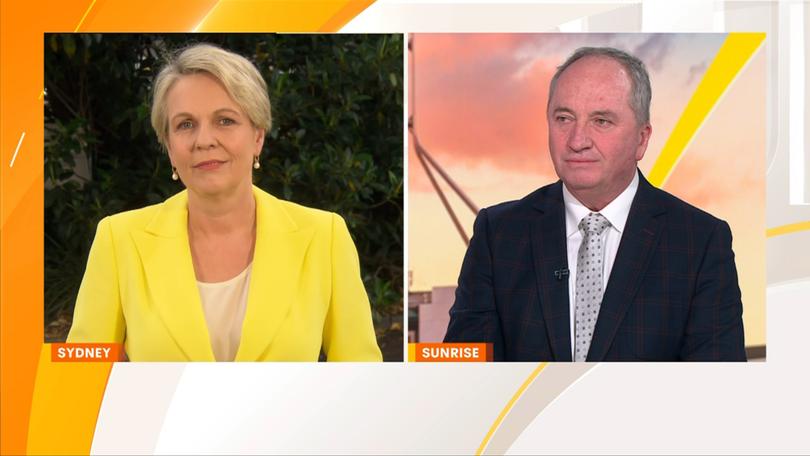Barnaby Joyce hammers government over Chinese technology amid US EV ban, as Labor minister confirms security agencies looking into the issue
‘America is pretty across their brief on security matters. There should be a discussion with them about what they see and what they know.’
Minister for the Environment Tanya Plibersek says the nation’s security agencies are looking into the possible weaponisation of Chinese-made electric vehicles as part of the country’s $600 million cybersecurity strategy as Nationals MP Barnaby Joyce took the government to task over the issue.
Her comments come a week after the US said it would ban Chinese-connected car technology from vehicles driven in the US over national security concerns, which would include hardware and software.
WATCH THE VIDEO ABOVE: Barnaby Joyce and Tanya Plibersek go head-to-head on Sunrise.
Sign up to The Nightly's newsletters.
Get the first look at the digital newspaper, curated daily stories and breaking headlines delivered to your inbox.
By continuing you agree to our Terms and Privacy Policy.They also followed Israel’s apparent booby trapping of pagers and phones used by terrorist organisation Hezbollah this month, which killed 37 and saw more than 2000 people injured after hundreds of handheld pagers simultaneously exploded.
On Monday, Plibersek joined Sunrise host Nat Barr and Nationals MP Barnaby Joyce for Hot Topics, where she was questioned about the imported technology and the potential for foreign interference.
Appearing opposite Barr, Joyce first referred to US President Joe Biden’s proposed Chinese EV ban, and then cited the presumed Israeli-led attack.
“Eight per cent of electric vehicles sold in Australia are currently manufactured in China. What’s your big problem with them?” Barr asked Joyce.
“My issue is I want to make sure our government, that has access to the national security committee, that includes Australian Security Intelligence Organisation (ASIO) and Australian Secret Intelligence Service (ASIS) … has clearly discussed with the United States what the issues are (with EV technology),” Joyce argued.
“We know after the Hezbollah issue, the Israelis managed to blow-up their pagers, the remote access and remote control devices is part of the new battlefield, and we want to make sure Australians are safe.”

Joyce noted there were Chinese-made solar panels on roofs across Sydney, Melbourne, and Brisbane, and noted Liberal homes affairs spokesperson Senator James Paterson had flagged the issue a possible security threat.
“If America believes there are concerns ... surely you’d say, well, America is pretty across their brief on security matters. There should be a discussion with them about what they see and what they know,” he said.
Barr asked Plibersek if the issues raised were a national security concern: “Tanya, Barnaby is concerned about vehicles coming in from China, solar panels coming in from China. Are our security committees looking at a possible danger here?”
Plibersek confirmed security agencies were assessing the situation as part of the Albanese government’s $600 million injection into its cybersecurity strategy, which was announced in November last year.
“There are computers in cars, in fridges, in your microwave, in your TV. Of course, all of them, potentially, can be accessed remotely,” Plibersek said, explaining the threat level.
“That’s why we’ve invested $600 million in our cybersecurity strategy. It’s why we’ve invested $70 million in countering foreign interference, and it’s why we take the advice of our security agencies so seriously.”
Barr doubled down on the question: “When we’ve seen the pagers blow up, is there any security concern with batteries that are put in items that are coming from China, and they’re landing in this country — is your government looking into this, Tanya?”
“Well, there’s a reason that we’re investing $600 million in our cybersecurity strategy. Of course, we have to be aware of computers, computer components etc,” Plibersek said.
“Is that in the brief after the pagers blew up?” Barr pressed.
“This is something that security agencies have been looking at for some time. You can have your laptop sitting on your desk … it can be accessed remotely … the camera can be turned on, the microphone can be turned on.
“We have to be confident we can withstand the remote accessing and potential spying that can go on (with this technology).”
Joyce said he did not want want to “ban,” EVs but wanted to make sure the country was “diligent,” and there was “oversight” with these types of foreign security concerns.
“Now, you’ve heard it first on Sunrise, we have a unity ticket here,” Joyce said.
“A malevolent force can watch you on your laptop, if they can do that, they can go into your car, into your hot-water system. They can plant code, meaning they have the capacity to access it later on. We’ve got to be aware of this,” he finished.
Originally published on Sunrise
